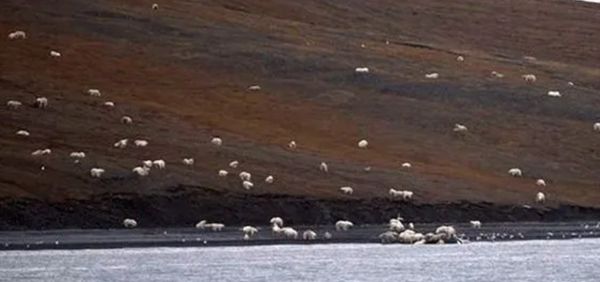
A group of tourists visiting the remote polar region got the surprise of a lifetime when they stumbled upon a gathering of polar bears on Wrangel Island. At first, they mistook the white animals for sheep grazing along the water. Little did they know, they were gazing upon more than two hundred polar bears that had flocked to the shoreline after a whale carcass washed up.
The spectacle began on September 19 and lasted for a day or two. The polar bears descended upon the area to feast on the whale, capturing the attention of the awe-struck tourists. Capt. Rodney Russ, who was leading the expedition, described it as a day he and his team will never forget. He shared, “We counted over 150 polar bears of all ages, sexes, and sizes feeding on or near the whale. We launched our Zodiacs for a closer look, and the memory is indescribable.”
The incident attracted the attention of The Siberian Times, who reported that as many as 230 polar bears were spotted devouring the whale carcass along the water’s edge. Some tourists initially mistook the bears for sheep due to the sheer number of them congregated in one spot. Wrangel Island, a nature reserve with abundant Arctic land, is home to the highest concentration of polar bear dens in the world. About four hundred mother polar bears raise their young on the island each winter.
This event highlights the significant impact human activity can have on animal behavior. The whale carcass, likely a victim of commercial whaling, became a plentiful food source for the hungry bears. It serves as a reminder of our responsibility to protect the environment and its inhabitants. By taking measures to combat climate change, preserve wildlife habitats, and regulate commercial operations, we can help prevent such incidents from occurring frequently. Let’s work together to ensure the well-being and safety of our planet and its remarkable creatures.





